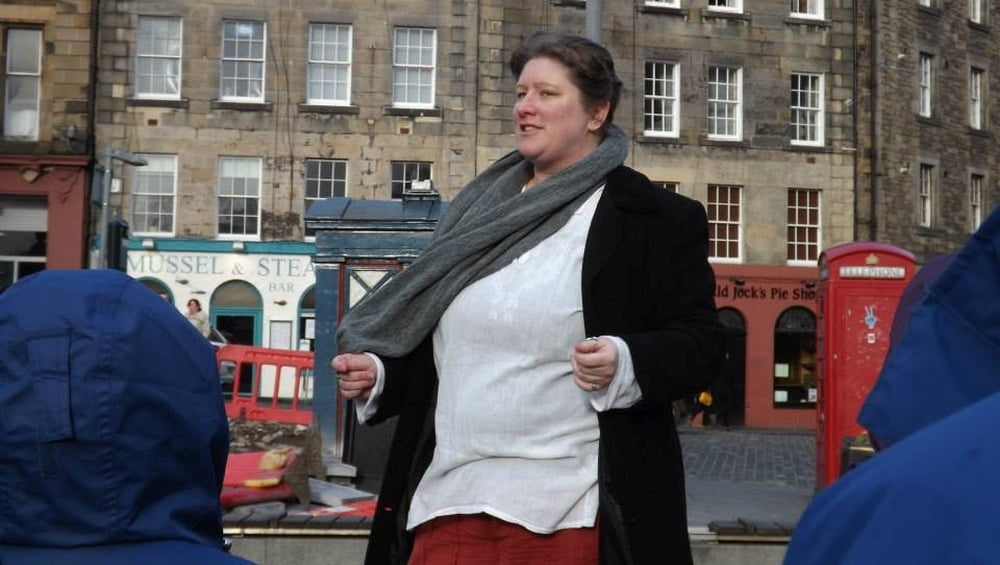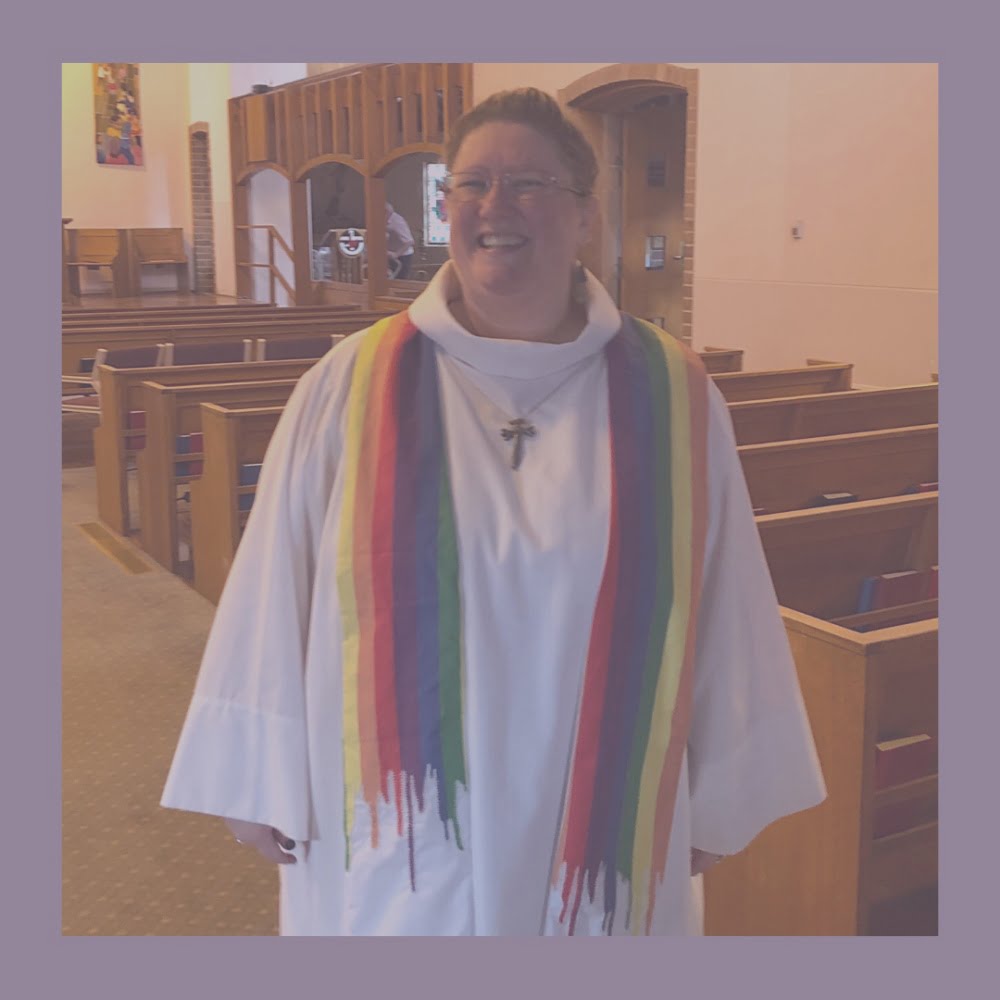What motivates our engagement in ministry
Looking back over my engagement in ministry and church leadership, I can see patterns and threads that weave throughout the different years and contexts. I caught a glimpse recently of one of those threads: I seem to be often motivated by a concern to invite those on the edge of church to come home in to Christian community. In some conversations, such folk are designated the ‘de-churched’, in church jargon shorthand for folk who once participated in the life of a Christian community, and now do not, or very rarely. (Side note, the ‘churched’ are those embedded in a Christian community through regular participation in worship, discipleship, offering care within and beyond the congregation; and ‘un-churched’ have never been part of a Christian community.)

Telling the Holy Week Stories in public places, Edinburgh, 2015. Meeting the people where they are, extending an invitation home.
There are many reasons one might become ‘de-churched’, might move from participating in Christian community to not: relationships with other congregation members might become troubled or broken; one might move to another neighbourhood or city, or into a new stage of life, and not find a new congregation that fits, or even have time to look; one might be subtly or overtly asked to change one’s sexuality or gender expression, or to leave; one might simply, in the natural development of our spirituality and discipleship, move forward in our ideas about God, or the kind of practices that nurture our being, and find the congregation where we are no longer as nurturing of our being as it once was.
Congregations, their members, their leaders, have long found ourselves unable to let go of fear when a member needs to move on. We feel we have failed, if we have ‘lost’ a sheep. Now, for some of those situations I’ve mentioned, that might be a fair assessment, to a degree, especially when we impose unjust restrictions and conditions on members being in order to participate in the life of our community. Many of the other reasons members move on are natural life development reasons, and congregations could travel with their members along the way to their next community of faith, if we could get over our sense of failure because we are no longer equipped to nurture this one. Usually, we are still well equipped to nurture the many in our congregation, and to attempt to be all things to all people to keep everyone here will jeopardise what we are doing well, and risk losing more.
We do fail the members of the body of Christ when we forget that the body of Christ is bigger than our one congregation, and we are not in competition with other congregations or even denominations: we are, in fact, in collaboration. Together, the members of the body that are congregations, nurture the individual human members of the body, by being our particular expression of the body of Christ with integrity – with a vibrant youth group, or a vibrant music ministry; with established programs of support for homeless and underemployed, or discussion series on ethics, philosophy, theology; with playgroups or tennis clubs or facilities hired by sports groups through the week. If a member’s personal growth uncovers an interest in serving disadvantaged folk in the wider community, and their belonging to a congregation across town will provide them with a community and opportunities for expressing their faith and being – why do we not encourage that member to leave us, why do we not send them out? Because their leaving feels like a failure. Their leaving takes their offering with them, their volunteer hours. We feel our loss.
What if we focussed on our gain – and in that, recognise that the ‘our’, the ‘us’, the ‘we’, is bigger than this congregation on this side of town. ‘We’ are the church with other congregations, and we need each other in our particularities, because the world’s needs are greater than any one congregation or even denomination (or I might say, faith tradition) can meet with their love and action alone.
For the ‘churched’ who are hanging on at the edges, and the ‘de-churched’ who have already stepped away, then, congregations and leaders can help keep them connected by giving them permission to disconnect and move on. We do this by knowing our neighbours, their strengths and particularities in meeting the world’s deep needs, so as to help disciples of Christ to find and participate in communities that will nurture their spirituality authentically.
Why is that important?

Jesus was about healing relationships and restoring folk to community, because our wholeness as human beings is inherently mutual. We are whole only together. Thriving individuals help make thriving communities. Thriving communities help nurture thriving individuals. People of all faiths gather together with others who have experienced the Sacred because humans are inherently relational. It helps us to make meaning to share our experiences and stories. Culture and place and myriad other influences shape each tradition and the stories that become Sacred; and this diversity allows for the diversity of human experience and being to find communities in which we are encouraged as we are to share our story, grow in understanding, and support others along the way.
Which brings me back to my own recurring motivation for ministry engagement over the years: inviting the ‘de-churched’ to come home, for their wellbeing, and for ours as the Church of God. For another way the church can travel with its members as we grow, is ourselves to grow, to adapt, to respond. Not to be all things to all people, but to discern where needs arise that we can meet, and have the courage to change.
Alternative worship, alternative church
I began Black Wood Jazz for people like me. People committed to the Way of God, and the church; and for whom church as we knew it wasn’t quite challenging and equipping us to live out that Way to our fullest potential. I wanted church to be a place we could wrestle with ideas, not be told what to believe. I yearned for space, invitation, deep and rich conversation.
When some of my peers were moving towards churches or youth groups whose teaching was more directive, whose approach was to offer tighter guidelines for how to live and what to think, I wanted less. I wanted less arrogance that ‘our’ way is the only right way; less certainty that this is what the Bible means, always has and always will. I wanted fewer words from the front, to make space for my own.
I also wanted more. More curiosity for the world, about God. More generosity towards the multiple stories that lead us into the heart of God. More stillness and silence, more doubt and discovery, more imagination and play!
This endeavour did not bring so many ‘de-churched’ home, as it encouraged the dissatisfied ‘churched’ to stay with the Body, for their sake and ours together.
I started The Esther Project for the artists disenfranchised by wordy dogmatic staid practices of church, of worship. Where was the silence? Where poetry? How were our bodies engaged beyond sitting and standing in proscribed moments? How our imaginations?
In the end, it was again a place for those still within the church wanting more depth, more curiosity, and less certainty.
For the sake of love
Back in an established congregation these days, I preside at rainbow weddings firstly for the sake of love. The love to which God calls us all.
And I do so knowing this is an invitation home for folk fed up with church saying you are wrong, you are not welcome, your love is less valued. At the rainbow weddings at which I have presided, I have heard deep gratitude from many for the welcome they have experienced. The welcome of their beloved family or friends getting married, for themselves as queer and hurt by the church in the past. For some, they have not been rejected for queerness, but have left the church for one of those myriad reasons. And still this radical welcome for the rainbow folk rejected by other parts of the church helps queer and straight ‘de-churched’ folk consider, if this is what church looks like, maybe I can come home?
If this is church, maybe I can come home?

Some of us followers of Jesus are called into slums, some into the shadow of Parliament House. Some are called to serve food and offer shelter to those in need, some to remind those who have enough of that need. Some of us are called to tell of God in word and deed with those who have not heard the Story before; some to heal broken relationships with kin who have left the fold, and offer welcome home into community, to family, to the Body for their wholeness and our wholeness together.
May each one seeking find home in the heart of God, home in a community of faith that nurtures us as we are into our fullest becoming.




Leave A Comment